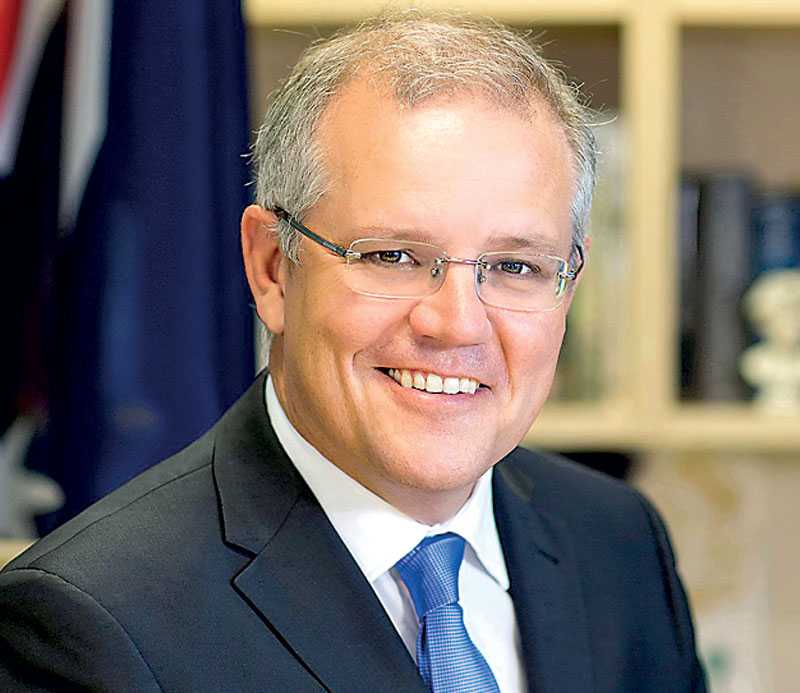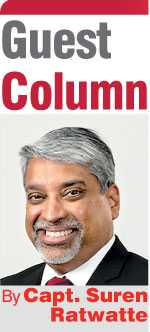Saturday Feb 21, 2026
Saturday Feb 21, 2026
Monday, 10 May 2021 00:00 - - {{hitsCtrl.values.hits}}

Australian Prime Minister Scott Morrison
 On 26 March 2020, Australian Prime Minister Scott Morrison imposed a lockdown and slammed the country’s borders shut. A new and lethal virus known as COVID-19 was sweeping across the globe. Australian health authorities were well aware that the last known global pandemic, the 1918 Spanish Flu, had resulted in the death of around 1% of the population, an awful toll but better than most other countries. The isolation of the colony (as it was then) had helped alleviate the worst of that dreaded disease. Determined to preserve that record, the PM used his authority as head of the federal government and acted quickly, isolating Australia once more.
On 26 March 2020, Australian Prime Minister Scott Morrison imposed a lockdown and slammed the country’s borders shut. A new and lethal virus known as COVID-19 was sweeping across the globe. Australian health authorities were well aware that the last known global pandemic, the 1918 Spanish Flu, had resulted in the death of around 1% of the population, an awful toll but better than most other countries. The isolation of the colony (as it was then) had helped alleviate the worst of that dreaded disease. Determined to preserve that record, the PM used his authority as head of the federal government and acted quickly, isolating Australia once more.
At the time many called it an overreaction. It seemed to be hastily thought out, with the initial requirement for entering Australians being ‘self-isolation’, later raised to mandatory government-supervised quarantine. States were left to impose their own quarantine regimes and contact-tracing systems – a phrase that was soon to become a familiar one.
The restrictions were largely successful, albeit with some digressions. Melbourne, in particular, had to endure several lockdowns, as the virus leaked out of an inadequately monitored hotel quarantine program. Several states imposed their own restrictions, with Western Australia isolating itself from much of the country for extended periods of 2020; but COVID-19 was successfully kept at bay and life in Australia today is largely normal. Other than a travel ‘bubble’ with New Zealand, though, the international borders remain closed.
 The law of unintended consequences
The law of unintended consequences
Australia has long been a magnet for international tourists. An estimated 9.5 million foreigners entered the nation in 2019, in addition to over 700,000 international students. Doomsayers forecast a cataclysmic effect on the nation’s tourism and hospitality industries. The Government predicted that the economy was expected to contract, and that unemployment would reach almost 9%. After enjoying over 30 years of economic expansion and practically full employment, this was likely to be a huge shock. Unprecedented government measures were put in place to cushion the population, causing the federal budget, going into deficit, instead of being a comfortable surplus.
Australia’s airline sector was affected immediately. Qantas acted quickly, grounding its entire long-haul fleet, laying off hundreds of staff, outsourcing many ground-based positions and renegotiating labour agreements. Virgin Australia (VA), the country’s second airline, went into voluntary bankruptcy and has since relaunched itself as a purely domestic operator, with a smaller fleet of Boeing 737s. VA’s entire fleet of widebody aircraft was returned to the lessors as part of the restructuring process.
The economy did contract for one quarter but the remaining six months have seen the largest quarterly lift in Gross Domestic Production (GDP) since the 1970s. What had been expected to be an economic Armageddon has turned out to be the best back-to-back quarters of growth in Australia’s recent history!
What happened?
It turns out that even the mandarins at the Treasury misunderstood Australia’s economy and spending patterns. Over 11 million Australians travelled overseas in 2019, as opposed to 9.5 million tourists visiting the country. Those travel-addicted Aussies had spent billions overseas, but in 2020 they were forced to either save that money or else spend it in the country.
In addition to the travel restrictions, many households were showered with cash as government programs delivered subsidies to much of the working population and pensioners. The majority of the money seems to have gone into retail sales and investments, but internal travel has seen a sharp resurgence, with subsidised domestic holiday programs wooing the frustrated traveller.
Regional Express, a purely domestic airline that operated turbo-prop aircraft to smaller cities, saw this as an opportunity. Acquiring several surplus VA Boeing 737s, Rex has morphed into a rival to Qantas and Virgin – the first time there have been three major airlines in the country for decades.
With record low interest rates adding to their savings, Australians have pushed up house prices to near-record levels. Car prices have soared too, with second-hand ones appreciating 45% over the last year. New cars have been selling rapidly, particularly in the luxury sector, as cashed-up Aussies treat themselves to a flash new vehicle. If you can’t go to Milan, buy a Ferrari instead!
The net benefit of the border restrictions to Australia’s economy in the December quarter alone is calculated to be AUD 7.5 billion. The full-year benefit may approach 30 billion. Little wonder that PM Morrison has stated that the borders will remain closed ‘. . . for the foreseeable future’.
The generals
Napoleon famously said: “Don’t bring me good generals, bring me lucky generals.” The charismatic and visionary French leader fully understood that in war, as well as life, luck is often the deciding factor. Some individuals seem to have a knack for being ‘in the right place at the right time’ and achieving spectacular results that seemingly more capable rivals cannot deliver.
Sri Lanka’s military achieved a spectacular victory against a resolute and capable enemy over 10 years ago. This was accomplished due to many factors. Among them was the political will displayed by the Government; the logistical capacity developed at great cost by the military; the sacrifices made by the civilian population; and the fighting qualities of the individual soldiers, sailors and airmen. But somewhere down the line, luck played its part too.
Now the military is once again at the forefront of combating a new, wily and invisible enemy that we had thought to be defeated, with accomplished generals in charge. If we are to vanquish COVID-19, which is currently counter-attacking ferociously, those same qualities of service, sacrifice and skill will have to be tempered with a dose of luck. I pray we succeed, for the consequences of failure are too terrible to contemplate.